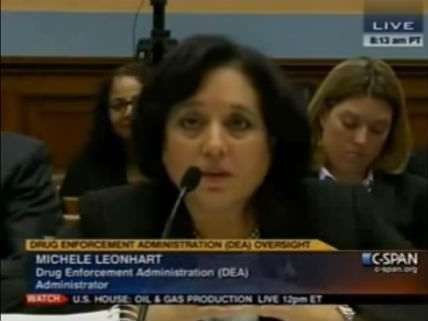The DEA's 'Four Decades of Impeding and Rejecting Science'

Yesterday I noted the Drug Enforcement Administration's irrational opposition to hemp cultivation, which many countries manage to allow without legalizing marijuana. One of the DEA's main arguments against hemp is that it can be used to conceal marijuana—a fear that makes little sense when you understand that the last thing a marijuana grower wants is to ruin his crop's potency by allowing it to be pollinated by hemp plants. A new report from the Drug Policy Alliance (DPA) and the Multidisciplinary Association for Psychedelic Studies (MAPS) reviews five other examples of the DEA's science-defying positions: its decision to ban MDMA, its rejection of three petitions seeking to move marijuana out of the most restrictive schedule of the Controlled Substances Act, and its defense of the federal government's monopoly on the production of cannabis for research.
In 1984, just two years after the DEA became aware that MDMA, a.k.a. Ecstasy, had become popular as a party drug, the agency announced its intent to ban it. That decision became final in 1986, despite the objections of psychiatrists and psychologists (including Nathaniel Branden) who said MDMA had great potential as a psychotherapeutic tool and should either remain unscheduled or be placed in a category less restrictive than Schedule I, a classification that makes all use illegal. DEA Administrative Law Judge Francis Young agreed, recommending that MDMA be placed in Schedule III. DEA Administrator John Lawn overruled Young, arguing (as the report puts it) that "MDMA need not have caused any actual harm to be placed in Schedule I" because "the potential for abuse was sufficient."
That same year, Young issued another decision that Lawn rejected. In response to a petition that was originally filed by the National Organization for the Reform of Marijuana Laws in 1972, Young recommended that marijuana be moved out of Schedule I, a category supposedly reserved for drugs with a "high potential for abuse" that have "no currently accepted medical use" and are so dangerous that they cannot be used safely, even under medical supervision. Calling marijuana "one of the safest therapeutically active substances known to man," Young said it did not fit the criteria for Schedule I. After Lawn overrode Young in 1989, the DEA rejected two other rescheduling petitions in 2001 and 2009, based on a loose definition of abuse potential and a strict definition of medical use. Since those terms are not defined by the CSA, the courts have given the agency a great deal of leeway in deciding where marijuana belongs.
Even as the DEA cites inadequate evidence of marijuana's medical utility as a reason to keep it in Schedule I, it obstructs studies aimed at providing such evidence by restricting the supply of cannabis for research. The only legal source is the National Institute on Drug Abuse (NIDA), which is stingy with its stash (unless you are trying to show how dangerous marijuana is) and cannot provide high-quality cannabis or a variety of strains. "No other Schedule I drug is available from only a single governmental source for research purposes," the DPA/MAPS report notes. "The DEA has licensed privately funded manufacturers of methamphetamine, LSD, MDMA, heroin, cocaine, and virtually all other controlled substances."
That situation, DEA Administrative Law Judge Mary Ellen Bittner concluded in a 2007, makes no sense. "NIDA's system for evaluating requests for marijuana has resulted in some researchers who hold DEA registrations and requisite approval from [HHS and FDA] being unable to conduct their research because NIDA has refused to provide them with marijuana," she wrote. "I therefore find that the existing supply is not adequate." Bittner ruled in favor of a MAPS-supported application from University of Massachusetts at Amherst plant scientist Lyle Craker, who wanted permission to grow marijuana for research. Michele Leonhart—the same bureaucrat who rejected the third rescheduling petition, refuses to say whether marijuana is less hazardous than heroin, and views the flying of a hemp flag flew over the Capitol as the low point of her career—overrode Bittner's ruling. Shortly after that decision, which Leonhart made as acting administrator, Barack Obama appointed her to head the agency, a job she retains despite publicly criticizing her boss and resisting his policies.
The DEA does not simply make scientifically dubious decisions against the recommendations of administrative law judges. It takes its own sweet time in doing so:
The DEA took 16 years to issue a final decision to the first marijuana rescheduling petition, five years for the second, and nine years for the third. In two of the three cases, it took multiple lawsuits to force the agency to act. Similarly, in the case of a researcher seeking an independent supply of marijuana for research purposes, it took the DEA 12 years—and another lawsuit—to deny the request.
The agency acts with a lot more alacrity when it wants to ban something, as illustrated by its decision to schedule MDMA. The report notes that the agency moved even faster to ban synthetic cannabinoids and stimulants in response to fears of ersatz pot and "bath salts." Is it possible that the agency in charge of prosecuting the war on drugs harbors a bias in favor of adding chemicals to the list of enemies?
Based on the DEA's track record of "impeding and rejecting science," DPA and MAPS say "responsibility for determining drug classifications and other health determinations should be completely removed from the DEA and transferred to another agency, perhaps even a non-governmental entity such as the National Academy of Sciences." They add that "the DEA should be ordered to end the federal government's unjustifiable monopoly on the supply of research-grade marijuana available for federally approved research." While the first reform would require action by Congress, the second could be accomplished unilaterally by a president who supposedly is committed to disentangling science from politics.
Reason TV recently interviewed MAPS President Rick Doblin:


Show Comments (19)